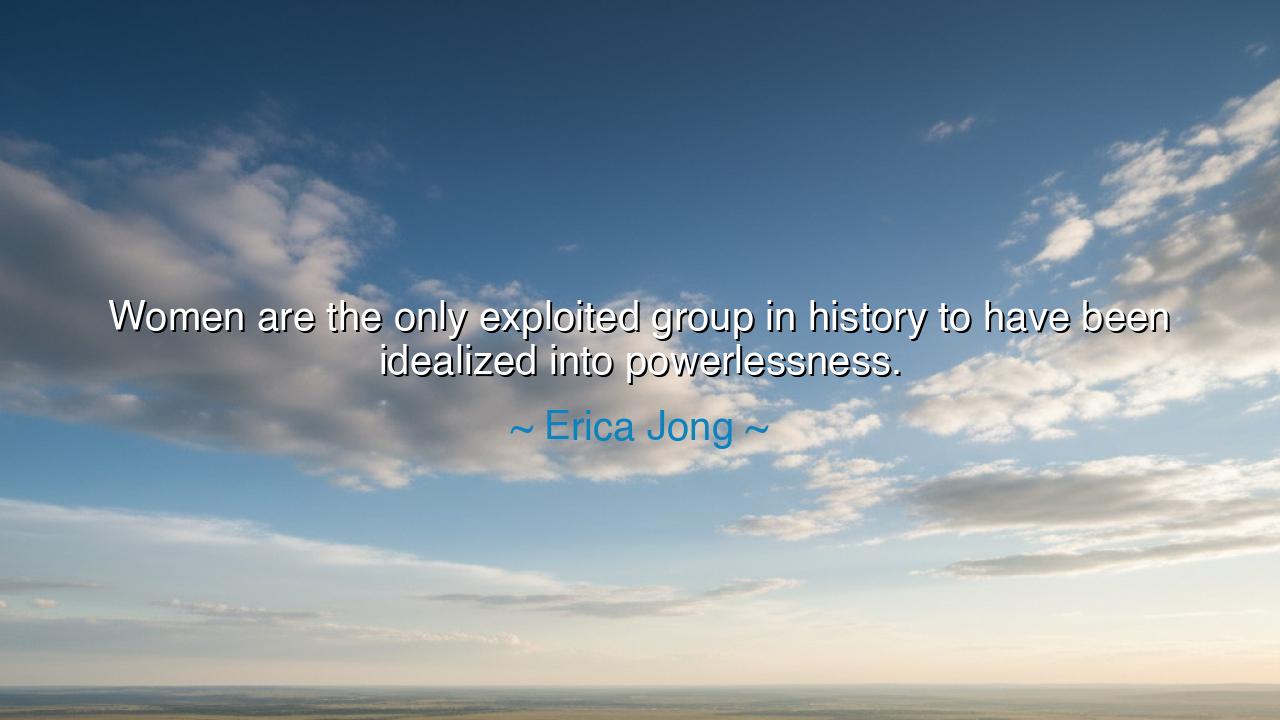
Women are the only exploited group in history to have been
Women are the only exploited group in history to have been idealized into powerlessness.






“Women are the only exploited group in history to have been idealized into powerlessness.” — Thus spoke Erica Jong, the fearless voice of a generation that tore the veil from illusion. In her words burns both sorrow and fire: sorrow for centuries of silence, and fire for the awakening of truth. For what she reveals is a paradox as old as civilization itself — that through the language of praise, through the worship of purity, gentleness, and grace, women were not lifted, but bound. They were placed upon pedestals so high they could no longer walk upon the earth as equals.
To be idealized into powerlessness — this is the cruelest deception of all. Chains made of iron can be seen and broken; chains made of reverence are invisible, and far stronger. Through songs and stories, women were called angels, muses, and mothers of virtue, yet in that adoration they were stripped of freedom. The world said, “You are too sacred to rule, too delicate to labor, too pure to decide.” And so, behind the mask of honor, they were denied voice, denied choice, denied destiny. It was not hatred, but idolization, that became the subtler weapon of control.
Consider the tale of the Victorian woman, enshrined as the “angel in the house.” She was taught to smile sweetly, to obey quietly, to shine by reflecting her husband’s light. Her virtue was her prison. While men conquered continents and debated empires, she was confined to parlors and prayers, told that moral superiority was her crown. In truth, it was her shackle. Many a woman of that age — poets like Charlotte Brontë, reformers like Florence Nightingale — felt the tension between reverence and reality. They were praised for being symbols, yet punished for being selves.
Through Erica Jong’s words, the illusion is shattered. She calls upon us to see that exploitation is not always marked by cruelty, but sometimes by praise. The conqueror who flatters may enslave more deeply than the one who strikes. To be told you are perfect is to be denied the right to grow; to be told you are pure is to be forbidden from being human. This is why Jong’s insight cuts so deeply — she exposes not only the injustice done to women, but the blindness of a society that mistook worship for equality.
And yet, history bears witness to women who refused this gilded cage. Hypatia of Alexandria, philosopher of the ancient world, stood among scholars and debated men as their equal. She was not praised for her gentleness, but respected for her mind — and in that, she claimed true power. Though she was later martyred by ignorance, her legacy became a beacon for centuries to follow. Like her, many women — from Joan of Arc to Simone de Beauvoir — rose from the ashes of idealization, wielding thought, courage, and defiance to reclaim the right to define themselves.
Jong’s quote is not only a cry of rebellion; it is a mirror for every generation. It warns us that oppression often wears the mask of admiration. Even today, when the chains of law have been broken, the chains of perception remain. Women are told they can be anything — yet expected to be everything. They are celebrated for strength, yet judged for its expression; praised for beauty, yet measured by it. The battle has shifted from the body to the soul, from the visible to the invisible.
Let this be your lesson: never accept adoration that demands your silence. Beware of praise that limits you, of love that cages you, of ideals that erase your imperfection — for it is in imperfection that freedom lives. True equality is not to be idealized, but to be recognized — as fully human, capable of triumph and failure, of wisdom and desire.
So, rise beyond the pedestal. Step down from the marble of false holiness and walk the earth in your own power. Let not the world tell you what womanhood must mean; write it anew, in the ink of your own voice. For as Erica Jong reminds us, to be idealized is not to be honored — it is to be silenced. And the time for silence has passed. The time now is for truth — fierce, imperfect, and free.






AAdministratorAdministrator
Welcome, honored guests. Please leave a comment, we will respond soon